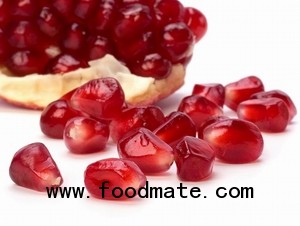 red by the wide diffusion of pomegranates in the United States back in 2007, prompting an initial plan to grow the crop in Chile.
red by the wide diffusion of pomegranates in the United States back in 2007, prompting an initial plan to grow the crop in Chile.“I was in New York and you saw them everywhere – Starbucks had food with pomegranate in it, there was the famous drink POMtini from POM Wonderful, and so we tried to plant it here in Chile,” managing director Ignacio Donoso Schulz told www.freshfruitportal.com during industry event Fruittrade last week.
“That didn’t go very well for us because of water rights and finally last year we thought, why don’t we get into agroindustry?
“There is an opportunity to bring added value with a fruit that is very powerful in terms of antioxidants and that we can sell ready to eat, due to the difficulty of consuming it fresh daily – it’s entertaining a few times but after a while it gets a bit complicated.”
He said the company brought in a multidisciplinary team of experts to develop a prototype last year that could process the arils, traveling the world to see how it was done in other pomegranate-focused areas like Israel.
“We developed the final model this year, with all the adjustments involved to have a machine that’s very good and competitive with the machines available abroad.
“We need around two or three pomegranates to make one pot, and each one is 5.4oz, so close to 150g.”
“We have a line where the pomegranates enter until they are in the packaging, with controlled atmosphere to extend the shelf life by up to 14 days. We are just 10 minutes from the airport, which allows us to ship by plane and be in the market the next day.”
He said the company had capacity to produce up to 40 metric tons (MT) of finished product each year, adding that the operation had attracted great interest to date from potential clients.
“We have been opening up channels and have had several people interested, mainly in the United States.
“The most important markets are the United States, Canada and England, where they eat in this ready-to-eat form.”
When asked about competition, Donoso Schulz emphasized that year-round supply of convenient, ready-to-eat arils would help boost pomegranates in general.
“More than being a competitor, we could be a good complement to all the Californian producers. By providing a fresh product, we can supply in the counterseason.
“A large amount of the clients we are looking for today are distributors on one hand, and growers on the other who are lacking this support of being able to ship all year, and are losing time in transport; around a month for a container, and the quality in the shipment.”





